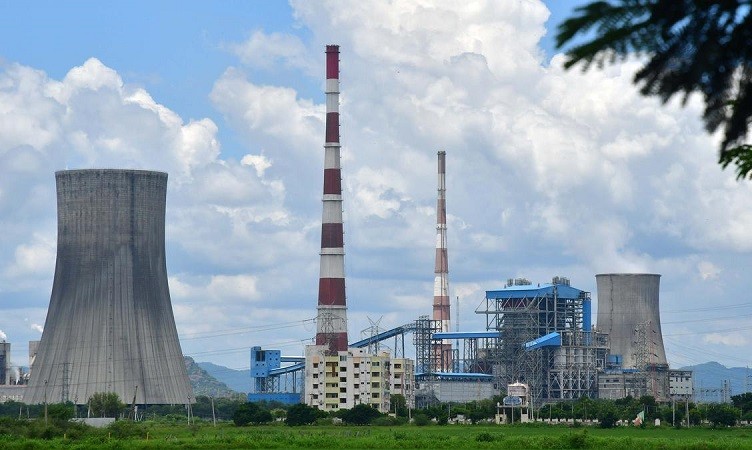
New Delhi: According to rating agency ICRA, India's thermal power sector is expected to have a growth spike in Plant Load Factor (PLF) and demand in the 2024 fiscal year, estimating a jump of 5.0-5.5%. The country's need for power and restrictions on the expansion of thermal capacity have been named as development factors.
ICRA, formerly Investment Information and Credit Rating Agency of India Limited, predicts that due to a strong increase in thermal Plant Load Factor and a decline in state power distribution companies' (DISCOMS') outstanding debt following the implementation of the Late Payment Surcharge (LPS) plan, the all-India thermal Plant Load Factor level will increase to 65.1% in FY2024 from 64.2% in FY2023, up from 64.2% in FY2023. Despite this, considering the nominal rate increases permitted for discoms in FY2024, ICRA's outlook for the power distribution industry is still negative.
The analysis predicts a moderate 5.0–5.5% increase in demand for FY2024, which is below the 6.0% GDP growth estimate for the same time period. Unseasonal rains have recently reduced demand, although a rebound is anticipated to start in late May 2023. Also, the potential for an El Nino event in FY2024 could give electricity demand a fillip.
ICRA forecasts that capacity additions for renewable energy will increase from 15 GW in FY2023 to 20 GW in FY2024, driven by an increase in tender activity and cost-reflective prices. The outlook for the renewable energy sector is seen as stable despite the spectre of execution risks and input cost pressures, bolstered by strong policy support, positive demand forecasts, and an advantage in tariff competitiveness.
The day-ahead market of the Indian Energy Exchange's average spot power tariffs held steady at Rs. 5.9 per unit in FY2023, with forecasts for a little decrease in FY2024 due to improved coal availability and a slowing in demand growth. Nevertheless, costs are anticipated to be much higher than the long-term average of Rs. 3.0-3.5 per unit, at roughly Rs. 4.5.
The acceptable condition of coal reserves at domestic power plants is also highlighted in the Icra research. As of mid-May 2023, supplies were estimated to last 13 days, which is a significant improvement over the same period the previous year.
In order to strengthen the financial stability of state discoms, the market intelligence agency emphasises the significance of implementing reform measures like smart metering and the prompt recovery of government dues. Icra anticipates that the cash gap per unit for state-owned discoms will remain high at above 60 paise per unit at the national level in FY2024, principally because of an increase in the cost of supply and rising interest costs, notwithstanding a reduction in the median tariff hike permitted for FY2024 to 0.3% from 2.1% in FY2023.
About ICRA: ICRA Limited, also known as ICRA, is one of the leading credit rating agencies in India. Established in 1991, ICRA provides independent and reliable assessments of creditworthiness for various financial instruments and entities, including companies, banks, financial institutions, and government bodies.
ICRA's credit ratings are widely used by investors, lenders, and other market participants to evaluate the credit risk associated with debt instruments. These ratings help investors make informed decisions and manage their investment portfolios effectively. ICRA's ratings are based on a comprehensive analysis of factors such as financial performance, industry dynamics, regulatory environment, and management quality.
Apart from credit ratings, ICRA offers a range of services including grading of initial public offerings (IPOs), assessing corporate governance practices, providing risk management solutions, and conducting industry research. The company's research reports and insights are highly regarded in the financial and business sectors.
ICRA operates as a subsidiary of Moody's Corporation, one of the largest credit rating agencies globally. This affiliation provides ICRA with access to global expertise and best practices in credit rating analysis.
Over the years, ICRA has gained a strong reputation for its independence, transparency, and credibility in the Indian financial market. Its ratings play a vital role in shaping investor confidence and facilitating efficient capital allocation.
Thermal Power Sector India Outlook: The Indian thermal power sector plays a crucial role in meeting the country's growing energy demand. Thermal power plants utilize coal, natural gas, or oil as fuel to generate electricity. India heavily relies on thermal power generation, accounting for a significant portion of its overall power capacity.
The sector has witnessed significant growth over the years, with the establishment of numerous thermal power plants across the country. These plants are typically large-scale installations, contributing significantly to India's power generation capacity.
However, the Indian thermal power sector faces several challenges. One of the primary concerns is the environmental impact of burning fossil fuels for electricity generation. Thermal power plants emit greenhouse gases and other pollutants, contributing to air pollution and climate change. Efforts are being made to mitigate these issues through the adoption of cleaner technologies and the enforcement of stricter environmental regulations.
Another challenge is the availability and affordability of fuel. India heavily relies on coal for thermal power generation, and ensuring a steady supply of coal can be a challenge. Additionally, fluctuations in global fuel prices can affect the operational costs of thermal power plants.
To address these challenges, the Indian government has been actively promoting renewable energy sources as an alternative to thermal power. Initiatives such as the National Solar Mission and increased investment in wind power aim to diversify the energy mix and reduce dependence on thermal power.
Furthermore, technological advancements, such as supercritical and ultra-supercritical power plants, are being implemented to improve the efficiency and reduce emissions from thermal power generation.
Overall, the Indian thermal power sector continues to play a significant role in meeting the country's energy needs. However, there is a growing focus on renewable energy sources and the adoption of cleaner technologies to ensure a sustainable and environmentally friendly power generation system in the long run.